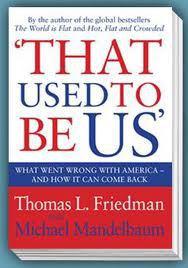 I’ve written about “Pakistan: The F**ked-Up Country.” America’s no Pakistan. But it sure is frustrating for optimists. Like Thomas Friedman and Michael Mandelbaum, whose 2011 book, That Used To Be Us, analyzes a group of key factors central to the miracle of America. And in every category, we’ve gone off the rails.
I’ve written about “Pakistan: The F**ked-Up Country.” America’s no Pakistan. But it sure is frustrating for optimists. Like Thomas Friedman and Michael Mandelbaum, whose 2011 book, That Used To Be Us, analyzes a group of key factors central to the miracle of America. And in every category, we’ve gone off the rails.
Our infrastructure grows seedy, with a huge backlog of postponed maintenance — never mind modernization. Investment in research and development shrinks. Education is inadequate for the competitive, high-tech, globalized marketplace. Cockeyed immigration policies shut out legions of motivated, brainy people we desperately need. We’re virtually ignoring climate change. We increasingly spend resources instead on burgeoning pensions, healthcare, and other “entitlements.”
In fact, we’re not paying for those either, going deeply into debt. How much can we actually borrow? Nobody can be sure, but we’re testing it, with borrowings already off the charts. There’s an old line about how one goes bankrupt: “at first gradually, then suddenly.” The “suddenly” comes when the world’s bond buyers decide we’re past the point of no return in managing (let alone repaying) our debt.
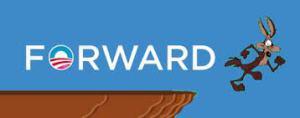
We’re able to – for now – only because interest rates are at historic lows, since the market still considers U.S. bonds the safest anywhere. But if (when) that changes, interest costs on our vast national debt will go through the roof. We’ll be even deeper in the red – and deep in a vicious circle.
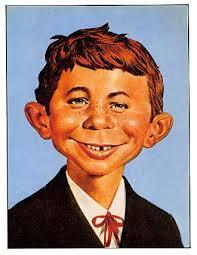
Economist Paul Krugman
We’ll be Greeced. (Paul Krugman laughs this off. He’s wrong.)
As the authors explain, this is a stealth crisis. Americans are complacent, imagining we can just continue running as before. Like the proverbial frog in the pot coming to boil (love all these metaphors?), we don’t notice we’re being cooked.
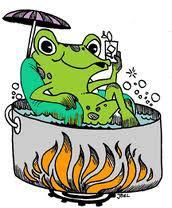
Which leads to what is really our supervening problem, blocking action on all the others: our broken politics. We can no longer take any serious action because it’s always a battlefield in take-no-prisoners partisan war which, in a closely divided nation, neither side can win.
And, unlike the other mentioned problems, this one has no obvious answer. Its roots are deep and complex. It’s not only that each side brooks no compromise. Worse, each has locked itself into denial of reality. Republicans deny the reality that taxes must rise; Democrats, that entitlements must be cut. (The book calls them “reactionary liberals,” sacralizing all existing social programs and fantasizing their funding through merely taxing the richest a bit more.)
The looming failure of immigration reform is especially disheartening. This should be a no-brainer. That America can’t this done shows government is brain-dead.
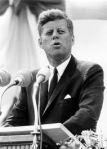
In fairness, the story isn’t all bleak. A key reason why we came out of the last recession while Europe remains quagmired is that we actually sorted out our banking sector problems much more expeditiously. (Technocrats did that, under the political radar.) And, to the systemic shock of 9/11, we reacted quite vigorously (indeed, overreacted).
America still has tremendous assets: relative economic openness, low corruption, strong rule of law, high social trust (contrast China in all these respects), and, most important, a lot of great human beings still filled with that great old American can-do spirit. Emblematic of this is the fracking revolution (typically hated by the left). Nothing government could do or not do would turn us into Pakistan. But staying Number One is another matter.
Americans are not a “chosen people” with God-given primacy. In many ways, we blazed a path much of Mankind has followed, but we can still be left behind, and that would be bad for the world. The Noam Chomskys who decry America’s global role are blind to how much good it does. The book’s authors see the U.S. effectively filling a world governance role, undergirding everyone’s prosperity. China won’t do this.
It’s customary in books like Friedman’s and Mandelbaum’s to offer solutions. I expected the usual laundry list of reforms that won’t happen. But instead they stressed a single idea I too have talked up. They quote Ohio Republican George Voinovich who, on quitting the Senate in 2010, said “we have to blow up the place.” Political “shock therapy” is what the authors prescribe, the political equivalent of the 9/11 shock. Specifically: a serious third party candidacy, representing a “radical centrism” that exposes the irresponsible denialism of the two other parties.

The book’s authors don’t expect their candidate to win. Instead, they say, if she got a sizable vote, that would provide the political shock to blow up the system’s ice blockage, with both main parties scrambling to regain those votes.
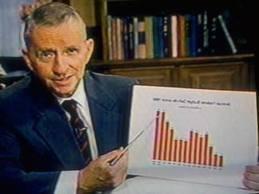
Imagine a candidate who treated American voters as adults, called out both the Democrats and Republicans for their failure to do so, and sensibly explained why painful sacrifices on taxes and entitlements are unavoidable. That candidate could have a huge impact. Especially with no incumbent running. And especially if he were well-financed, and a credible, compelling personage who would command attention.

I nominate Bill Gates.
